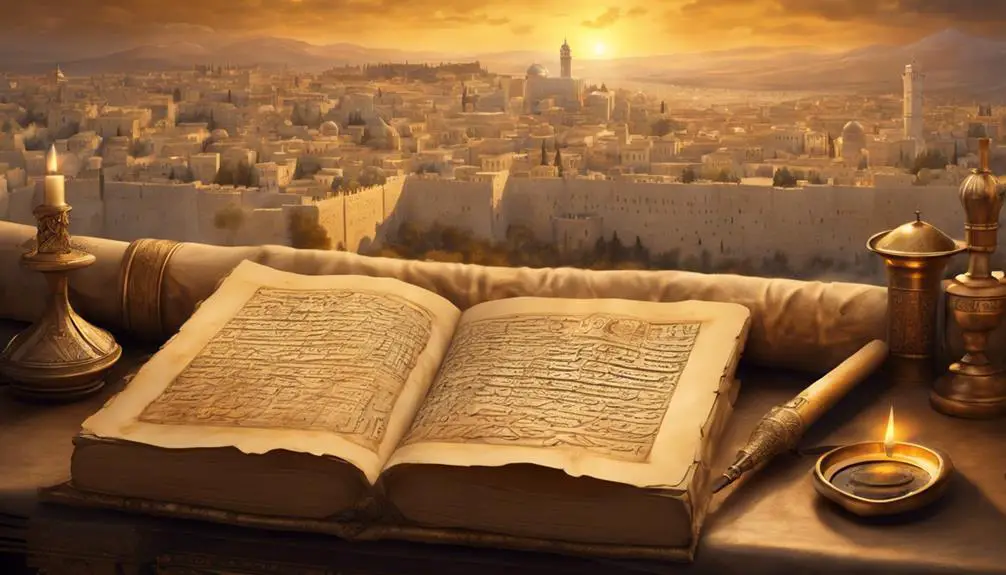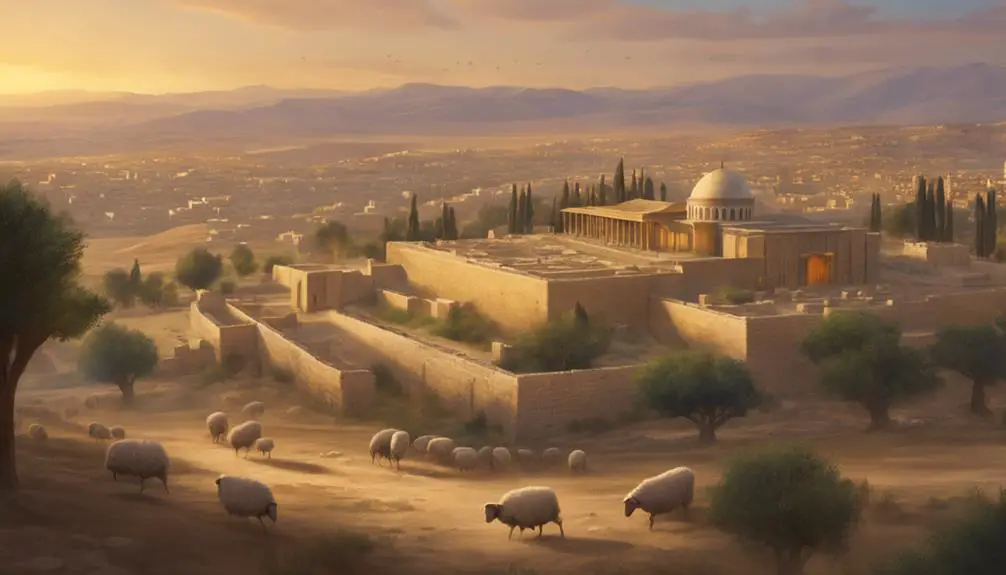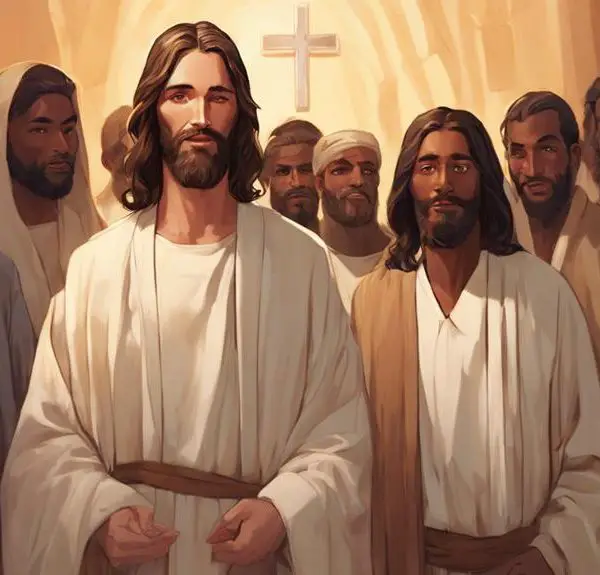Ongoing debates swirl around the true authorship of Zechariah, sparking questions about the prophet's role in penning this biblical book.

Who Wrote Zechariah in the Bible
You've likely heard the traditional attribution of the book of Zechariah to the prophet himself, but have you ever paused to ponder whether this theory holds water? As you delve into the historical context and literary style of the book, you'll begin to notice intriguing clues that suggest Zechariah's authorship, from the consistent tone and themes to the alignment with his prophetic ministry. But what about alternative theories that propose anonymity or connections to other figures like Jeremiah? The more you examine the evidence, the more questions arise – and the mystery surrounding Zechariah's true author only deepens.
Historical Context of Zechariah

When you explore the book of Zechariah, it is important to grasp the historical context in which it was written, particularly during the Persian period, around 520-518 BCE, when the Jews had returned from exile in Babylon. During this time, the Persian Empire, under the rule of Darius I, allowed the Jews to return to Jerusalem and rebuild the Temple. This period of reconstruction and restoration is the backdrop against which Zechariah's prophecies took place. As you investigate the book, you'll notice that Zechariah's message is deeply rooted in the post-exilic context, addressing the concerns and hopes of a community struggling to rebuild their lives and their city. The Babylonian exile had left deep scars, and Zechariah's prophecies sought to bring comfort, encouragement, and a renewed sense of purpose to the people. Understanding this historical context is essential to grasping the significance of Zechariah's message and its relevance to the community he was addressing.
Zechariah's Writing Style Clues

As you explore the book of Zechariah, you'll notice that the prophet's writing style is characterized by a unique blend of apocalyptic visions, symbolic language, and prophetic oracles that reflect his role as a messenger of God's plans for the restored community. This distinct style is marked by deliberate syntax patterns, which create a sense of rhythm and flow, drawing the reader into the prophet's vision. Zechariah's use of rhetorical devices, such as metaphors and allegories, adds depth and complexity to his message, inviting the reader to engage with the text on multiple levels. For instance, his use of numerical symbolism, like the seven eyes of God, conveys a sense of divine omniscience and omnipotence. Furthermore, Zechariah's employment of literary devices like repetition and parallelism emphasizes the importance of certain themes, such as the restoration of Jerusalem and the return of God's presence. By examining these stylistic features, you can gain a deeper understanding of Zechariah's message and the historical context in which it was written.
Theories on Zechariah's Identity

In your exploration to uncover the identity of Zechariah, you'll encounter various theories that have emerged over the centuries, each attempting to shed light on the prophet's enigmatic persona. As you investigate further, you'll notice that the prophet's anonymity is a deliberate choice, reflecting a sense of Prophetic Anonymity. This self-effacing approach allows the message to take center stage, rather than the messenger. This Authorial Humility is a hallmark of prophetic literature, where the focus is on the divine revelation rather than the human vessel.
Several theories propose that Zechariah might have been a priest, given the emphasis on temple rituals and the priestly concerns in his prophecies. Others suggest that he might have been a member of the royal family, citing the prophet's apparent access to the ruling elite. Another theory points to Zechariah being a student of Jeremiah, given the similarities in their prophetic styles. While these theories offer intriguing possibilities, they ultimately remain speculative, leaving Zechariah's true identity shrouded in mystery.
Zechariah's Connection to Haggai

Your investigation of Zechariah's identity leads you to explore his connection to Haggai, another prophet who prophesied during the post-exilic period, and you'll find that their shared concerns and themes suggest a collaborative or contemporaneous relationship. As you dig deeper, you'll discover that Haggai's influence on Zechariah is undeniable. Both prophets emphasized the importance of rebuilding the Temple and restoring the Jewish community. Their messages harmonize, reflecting a sense of prophetic harmony.
Here are some key similarities between Zechariah and Haggai's prophecies:
- Emphasis on Temple rebuilding: Both prophets urged the people to rebuild the Temple, highlighting its significance in Jewish worship and identity.
- Concern for the Jewish community: Zechariah and Haggai shared a concern for the welfare and restoration of the Jewish community, encouraging them to return to their covenant obligations.
- Focus on spiritual renewal: Both prophets emphasized the need for spiritual renewal, calling the people to repentance and a deeper commitment to God.
- Urgency and encouragement: Zechariah and Haggai's prophecies convey a sense of urgency, encouraging the people to take action and promising divine blessing for obedience.
Post-Exilic Period Insights

As you explore the post-exilic period, you'll uncover a complex, tumultuous era in Jewish history, marked by the gradual rebuilding of Jerusalem and the reconstruction of the Temple. Probing into the post-exilic period reveals a time of significant transformation, where the Jewish community struggled to rebuild their identity and faith after the devastating Babylonian exile. The Persian influence is palpable, as the empire's tolerant policies allowed the Jews to rebuild and restore their religious practices. However, the Babylonian legacy still lingered, with the community grappling with the trauma of exile and the loss of their national sovereignty.
You'll notice that Zechariah's prophetic message is deeply rooted in this post-exilic context. His visions and oracles reflect the community's hopes and fears, as they navigated the challenges of rebuilding and restoration. The prophet's emphasis on the Temple's reconstruction, for instance, speaks to the community's desire to reestablish their connection with God and reclaim their spiritual heritage. By examining Zechariah's prophecy through the lens of the post-exilic period, you'll gain a deeper understanding of the historical and cultural context that shaped his message.
Linguistic Analysis of Zechariah

You'll find that a closer examination of Zechariah's language and style reveals a distinct prophetic voice, one that explores apocalyptic imagery, messianic hope, and pastoral concern. As you investigate further into the book of Zechariah, you'll notice that the prophet's linguistic choices are deliberate and meaningful. For instance:
- Syntax patterns: Zechariah's use of Hebrew syntax is characterized by a preference for short, punchy sentences that convey a sense of urgency and intensity.
- Hebrew idioms: The prophet frequently employs idiomatic expressions, such as 'the eyes of the Lord' (Zechariah 4:10), which add a layer of cultural depth to his message.
- Metaphorical language: Zechariah's vivid metaphors, like the 'flying scroll' (Zechariah 5:1-4), create a rich tapestry of imagery that invites the reader to engage with the prophetic vision.
- Rhetorical questions: The prophet's strategic use of rhetorical questions (e.g., Zechariah 7:5-7) encourages the reader to reflect on their own spiritual state and relationship with God.
Through this linguistic analysis, you'll gain a deeper appreciation for Zechariah's masterful use of language, which serves to convey his prophetic message with precision and power.
Apocalyptic Imagery in Zechariah

As you explore Zechariah's prophetic visions, you'll notice the prevalence of apocalyptic imagery. Zechariah's apocalyptic imagery is characterized by vivid, otherworldly descriptions, such as the four horses and chariots of colors (Zechariah 1:8-11), which serve to convey the prophet's vision of a cosmic struggle between good and evil. This struggle is exemplified through symbolic beasts, representing both divine and malevolent forces. You'll encounter cosmic battles, where heavenly messengers intervene on behalf of God's people, and divine judgments are meted out to the wicked. These vivid descriptions are not mere fantasy, but rather a means of conveying the prophet's message of redemption and restoration. Through Zechariah's apocalyptic imagery, you're invited to glimpse the spiritual dimension, where the forces of good and evil clash in a struggle that will ultimately culminate in God's triumph. As you explore these visions, you'll gain insight into the prophet's understanding of the cosmic struggle and its implications for humanity.
Ancient Jewish Traditions

Zechariah's prophetic visions are deeply rooted in ancient Jewish traditions, which influenced his eschatological outlook and shaped the symbolic language of his apocalyptic imagery. As you explore the book of Zechariah, you'll notice the significant connection to ancient Jewish customs and beliefs. This connection is essential in understanding the prophet's message and its significance in the biblical narrative.
Here are some key aspects of ancient Jewish traditions that influenced Zechariah's prophecy:
- Messianic Expectations: Zechariah's visions reflect the common Jewish expectation of a future Messiah who would bring redemption and restoration to Israel.
- Rabbinic Interpretations: Zechariah's use of symbolic language and apocalyptic imagery can be seen as an extension of Rabbinic interpretations of earlier prophetic texts.
- Temple Theology: Zechariah's emphasis on the rebuilding of the Temple and its significance in God's plan of redemption is rooted in ancient Jewish traditions.
- Eschatological Hope: Zechariah's prophecy is characterized by an eschatological hope that is deeply rooted in ancient Jewish traditions, emphasizing the importance of God's intervention in human history.
Scholarly Consensus on Authorship

While exploring the rich tapestry of ancient Jewish traditions that underpin Zechariah's prophecy, scholars have also sought to pinpoint the author behind the book, and a broad consensus has emerged on the question of who wrote Zechariah. You'll find that the majority of scholars agree that the book of Zechariah was written by the prophet Zechariah himself, with some possible editorial contributions from ancient scribes. This consensus is based on rigorous textual criticism, which involves a meticulous analysis of the linguistic, historical, and literary features of the text. By examining the language, style, and themes present in the book, scholars have been able to identify a clear authorial voice that is consistent with the prophet Zechariah's ministry. Moreover, the lack of contradictory evidence and the coherence of the book's message also support the traditional attribution of authorship to Zechariah. As you explore further into the scholarly debates surrounding Zechariah's authorship, you'll find that the consensus view is well-supported by the evidence and provides a compelling explanation for the book's origins.



Sign up